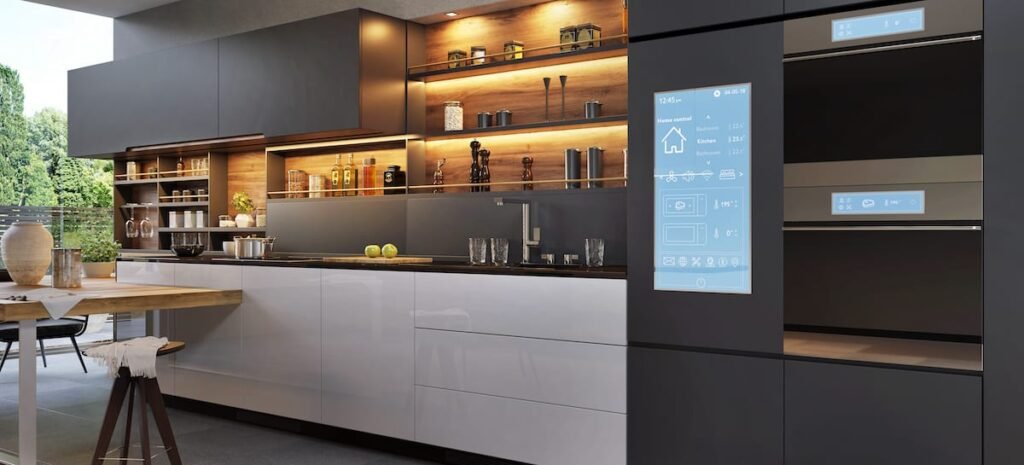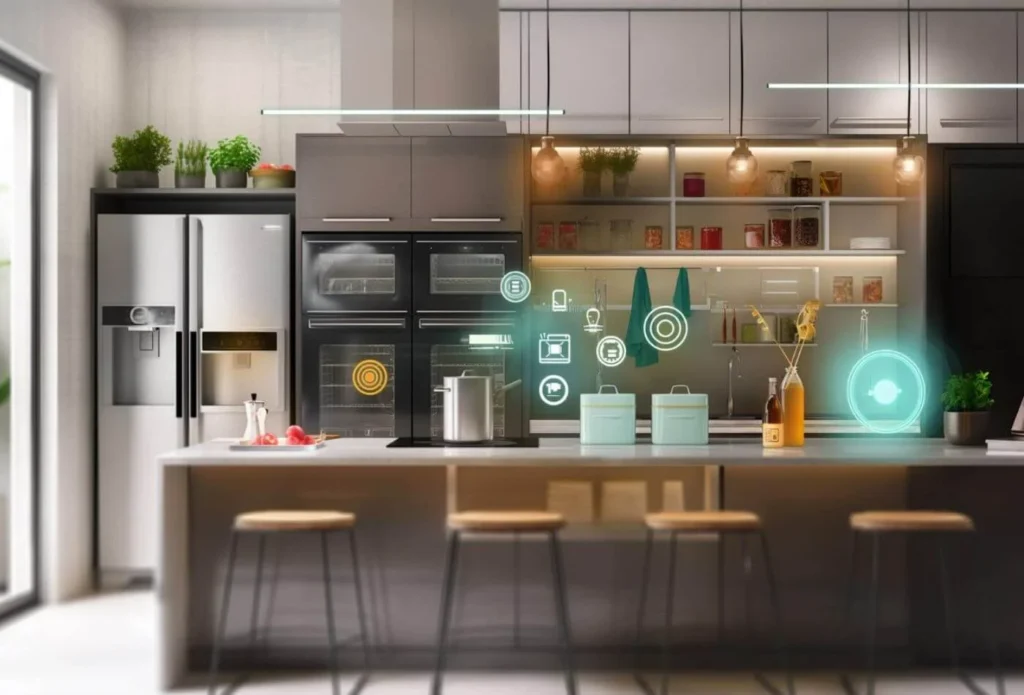As technology advances, smart kitchens are transforming the way we approach food preparation, cooking, and home management. A smart kitchen integrates appliances and devices that are interconnected through the internet and can be controlled remotely or autonomously. This integration not only adds convenience but also boosts efficiency, helping homeowners save time, energy, and effort. Here’s how smart kitchens enhance home efficiency.
1. Time-Saving Benefits of Smart Kitchens
Time is one of the most valuable resources, and smart kitchens help users save significant amounts of it. For instance, smart appliances like ovens, refrigerators, and dishwashers come equipped with features designed to simplify tasks that usually consume much of your time.
Smart Ovens and Cooktops
Smart ovens, like the ones with voice control or remote settings, allow you to set cooking temperatures, times, and even preheat your oven while you’re on the go. Whether you’re busy with work or relaxing on the couch, controlling the oven from your smartphone or smart assistant can be a game-changer. These appliances come with preset cooking modes, meaning you can follow recipes with one touch. Many smart cooktops also include features like automatic heat adjustment, reducing the need for constant supervision.
Intelligent Refrigeration
Smart refrigerators help streamline your food storage. Equipped with cameras inside, these fridges can track your inventory and alert you when you’re running low on essential items. Some even allow you to view the contents remotely through an app. This can save time by helping you create shopping lists automatically, preventing you from wandering the aisles or forgetting to buy needed ingredients.
Automated Dishwashers
Dishwashers are a critical part of the kitchen, but they often consume considerable amounts of time. With smart dishwashers, you can start or pause a wash cycle remotely via your smartphone. These dishwashers can also optimize energy usage by adjusting water temperatures and washing cycles based on the load size, saving both time and energy.
2. Enhanced Energy Efficiency

Smart kitchens are also designed to enhance energy efficiency, reducing household energy consumption and lowering utility bills.
Energy-Efficient Smart Appliances
Many smart kitchen appliances are designed to be energy efficient. For example, smart refrigerators have energy-saving modes that adjust cooling levels based on usage patterns. Similarly, smart ovens can detect the size and type of cookware and adjust the heat accordingly, preventing wasted energy. Smart dishwashers can also automatically adjust water temperature and cycle time, ensuring that energy consumption is minimized without compromising cleanliness.
Energy Monitoring and Control
Smart kitchen systems can integrate with home energy management tools, allowing you to monitor and control the energy usage of individual devices. Through a centralized app or smart assistant, homeowners can check the status of appliances in real time and adjust settings to optimize energy consumption. For instance, lights can be turned off automatically when the kitchen is not in use, or appliances can be scheduled to run during off-peak electricity hours, when rates are lower.
3. Smart Kitchens for Better Food Management
One of the most significant ways smart kitchens improve efficiency is through better food management. These technologies help to reduce food waste and ensure that every item in your kitchen is used effectively.
Inventory Management Systems
Smart refrigerators with inventory tracking capabilities allow you to keep track of what’s in your fridge or pantry without opening the door and searching through items. These fridges can provide alerts when items are nearing their expiration date, helping you plan meals more effectively. Some models even allow you to scan barcodes to add food items directly to your inventory, and they may suggest recipes based on the ingredients you have on hand.
Meal Planning and Recipe Suggestions
Smart kitchens make meal planning easier than ever before. Some smart fridges and apps can suggest recipes based on what you already have in your kitchen, reducing food waste and simplifying the cooking process. Additionally, smart kitchen devices can integrate with grocery delivery services, allowing you to purchase ingredients with just a few taps, making meal prep even more streamlined.
Smart Cookware
Many kitchen gadgets are becoming smarter, too. Smart cookers, such as pressure cookers and slow cookers, allow users to automate cooking processes. With programmable settings and the ability to control them remotely, these appliances reduce the need for manual attention, ensuring that your food is perfectly cooked without the risk of overcooking or burning.
4. Kitchen Organization and Space Optimization
Efficient kitchens are organized, and smart kitchen technology can make a real difference when it comes to optimizing available space and keeping everything in its place.
Smart Lighting Solutions
Smart lighting is another way that smart kitchens help improve efficiency. Lights can be automated to turn on when you enter the kitchen and turn off when you leave, saving energy and ensuring that you never forget to turn off the lights. Additionally, voice-controlled lighting lets you adjust brightness without having to move around, which is particularly useful when you’re busy cooking or cleaning.
Smart Storage Systems
Smart kitchen storage solutions, such as adjustable shelves or sensor-based cabinets, can help keep things organized. Some high-tech cabinets can even open automatically with motion sensors, providing hands-free access to stored items, which reduces physical effort and increases convenience.
Waste Management Systems
Smart waste management solutions are also making kitchens more efficient. Smart trash cans with sensors can open automatically when approached, and some even track how much waste you’re generating, helping you reduce and recycle more effectively. These waste bins can also remind you when it’s time to take out the trash or suggest ways to reduce food waste based on your habits.
5. Smart Kitchen Devices Improve Health and Safety
Smart kitchens do more than just enhance efficiency—they can also contribute to a healthier and safer home environment.
Improved Food Safety
Smart kitchen appliances help you ensure food safety by alerting you when temperatures are too high or low. Smart fridges and freezers, for instance, can notify you if the temperature inside the appliance fluctuates, potentially preventing food spoilage. Some smart ovens also feature sensors that alert you when food is done, helping to avoid overcooking or burning meals, which can lead to health hazards.
Safety Features in Appliances
Many smart kitchen devices come with advanced safety features, such as automatic shutoff mechanisms in smart stoves or ovens. These features are particularly beneficial for households with children or elderly family members, providing peace of mind knowing that appliances are less likely to cause accidents.
Smart Faucets for Water Conservation
Smart faucets are equipped with sensors that can detect when hands are placed under the tap and shut off automatically after a set time. This reduces water waste and improves hygiene, making them perfect for busy kitchens where time and resources are precious.
6. Remote Control and Automation
One of the key features of a smart kitchen is the ability to control devices remotely, which adds another layer of convenience and time-saving.
Voice Assistants for Seamless Control
Voice-activated devices such as Amazon Alexa, Google Assistant, or Apple Siri can be integrated into your kitchen to control various appliances. For instance, you can preheat the oven, set timers, or adjust your refrigerator’s settings just by asking your voice assistant. This hands-free control allows you to multitask and stay focused on cooking, cleaning, or other activities without the need to physically interact with appliances.
Smart Home Integration
Smart kitchens can also be integrated into a larger smart home system, allowing you to control various household devices from one platform. For example, you can set the lights, manage temperature settings, and monitor kitchen appliances all from your smartphone or smart speaker. This integration provides an effortless way to keep your home running smoothly, increasing efficiency across all aspects of your daily life.
Conclusion: The Future of Efficient Kitchens
Smart kitchens are not just a trend—they’re the future of efficient home management. By integrating cutting-edge appliances and devices, smart kitchens make cooking, cleaning, food storage, and organization faster, easier, and more energy-efficient. With the ability to control devices remotely, optimize energy use, and manage food better, a smart kitchen not only saves you time and money but also contributes to a healthier, more sustainable lifestyle.
As technology continues to evolve, the opportunities to enhance kitchen efficiency are endless. Embracing smart kitchen solutions today will undoubtedly pave the way for an easier, more efficient tomorrow in your home.
